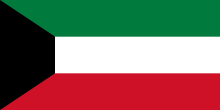Effects of the storage conditions on the stability of natural and synthetic cannabis in biological matrices for forensic toxicology analysis: An update from the literature
The Kuwait Portal Kuwait, officially the State of Kuwait, is a country in West Asia. It is situated in the northern edge of Eastern Arabia at the tip of the Persian Gulf, bordering Iraq to the north and Saudi Arabia to the south. With a coastline of approximately 500 km (311 mi), Kuwait also shares a maritime border with Iran. Most of the country's population reside in the urban agglomeration of Kuwait City, the capital and largest city. As of 2023, Kuwait has a population of 4.82 million, of which 1.53 million are Kuwaiti citizens while the remaining 3.29 million are foreign nationals from over 100 countries. Historically, most of present-day Kuwait was part of ancient Mesopotamia. Before the discovery of oil reserves in 1938, the country was a regional trade port; from 1946 to 1982, the country underwent large-scale modernization, largely based on income from oil production. In the 1980s, Kuwait experienced a period of geopolitical instability and an economic crisis following the stock market crash. In 1990, Kuwait was invaded and subsequently annexed by Iraq under the leadership of Saddam Hussein following disputes over oil production. The Iraqi occupation of Kuwait ended on 26 February 1991, following an American-British-French-Saudi-Egyptian led international coalition culminating in the expulsion of Iraqi forces. Like most other Arab states in the Persian Gulf, Kuwait is an emirate; the emir is the head of state and the ruling Al Sabah family dominates the country's political system. Kuwait's official state religion is Islam, specifically the Maliki school of Sunni Islam. Kuwait is a high-income economy, backed by the world's sixth largest oil reserves. Kuwaiti popular culture, in the form of theatre, radio, music, and television soap opera, is exported to neighboring Gulf Cooperation Council (GCC) states. Kuwait is a founding member of the GCC and is also a member of the United Nations, the Arab League, OPEC, and the Organisation of Islamic Cooperation. (Full article...) Selected article - The emir of the State of Kuwait (Arabic: أمير دولة الكويت) is the monarch and head of state of Kuwait, and is the country's most powerful office. The emirs of Kuwait are members of the Al Sabah dynasty. Sheikh Mishal Al-Ahmad Al-Jaber Al-Sabah became the emir of Kuwait on 16 December 2023, following the death of Nawaf Al-Ahmad Al-Jaber Al-Sabah. (Full article...)Did you know...
Related portalsReligions in Kuwait Arab states Other countries TopicsWikiProjectsAssociated WikimediaThe following Wikimedia Foundation sister projects provide more on this subject:
Discover Wikipedia using portals Purge server cache |























































